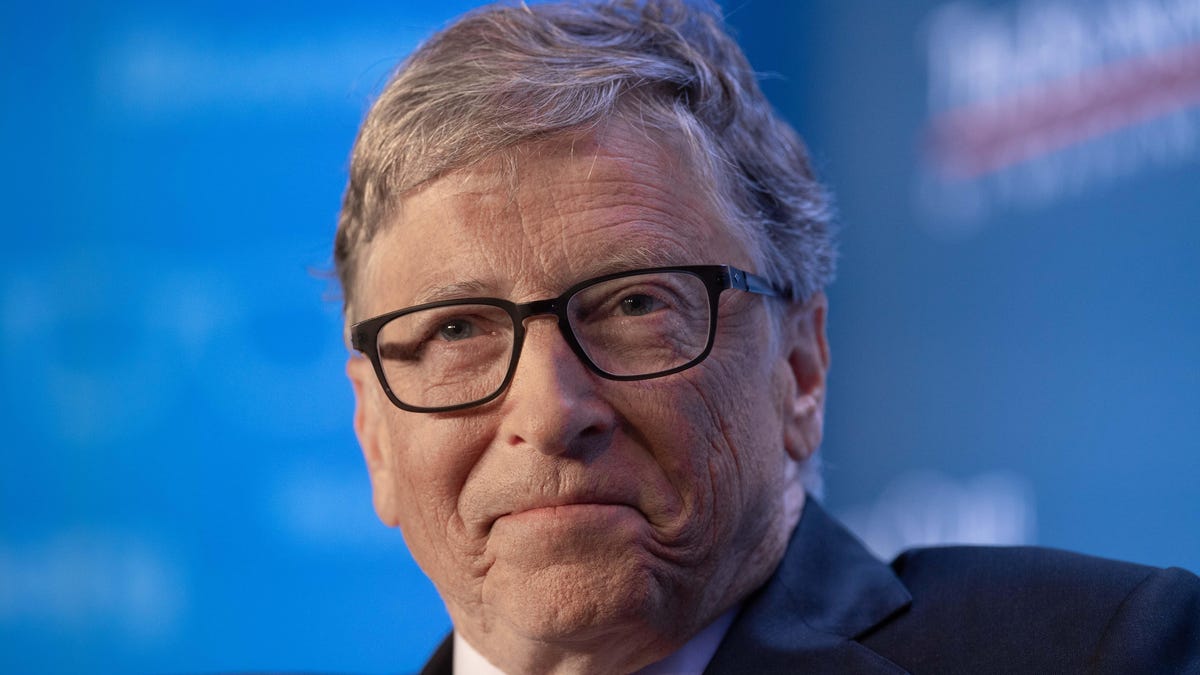Elizabeth Warren offers to explain her wealth tax to Bill Gates
Gates had said he didn't think Warren would want to meet with someone as rich as he is.

When asked who he'd vote for in 2020, Bill Gates said "whoever I decide would have the more professional approach" as president.
Microsoft co-founder Bill Gates said Wednesday he didn't think Elizabeth Warren, a leading Democratic presidential hopeful, would want to meet with someone as rich as he is, a comment that came as the billionaire criticized her calls to break up big tech companies. Turns out, she would.
Speaking at the New York Times DealBook conference, Gates said breaking up companies isn't the way to address the issue of tech giants favoring their own products over others, as Amazon has been accused of doing. Gates has good insight into government attempts to break up companies. The government spent a decade trying to break up Microsoft over antitrust concerns.
"I'm super biased," Gates said. "I didn't think Microsoft should be broken up," and he wouldn't "wish that on anyone."
In a lighter moment, Gates also said he wasn't sure if Warren is open-minded or would "even be willing to sit down with somebody who has large amounts of money."
Warren tweeted her response to Gates later the same day. "I'm always happy to meet with people, even if we have different views," Warren said. "If we get the chance, I'd love to explain exactly how much you'd pay under my wealth tax. (I promise it's not $100 billion.)"
I'm always happy to meet with people, even if we have different views. @BillGates, if we get the chance, I'd love to explain exactly how much you'd pay under my wealth tax. (I promise it's not $100 billion.) https://t.co/m6G20hDNaV
— Elizabeth Warren (@ewarren) November 7, 2019
He responded to her on Twitter as well. "You and the other candidates are having a really interesting conversation on how to solve some of the world's toughest problems like eliminating global poverty and avoiding a climate disaster (though those issues don't get talked about as much as they should)."
You and the other candidates are having a really interesting conversation on how to solve some of the world’s toughest problems like eliminating global poverty and avoiding a climate disaster (though those issues don’t get talked about as much as they should).
— Bill Gates (@BillGates) November 7, 2019
"I greatly respect your commitment to finding ways to address wealth inequality and poverty at home," Gates wrote in a following tweet. "While we may disagree about some of the ways to get there, we certainly agree we need a lot of smart people committed to finding the path forward. I'm always willing to talk about creative solutions to these problems."
On Thursday, Warren doubled down on her response: Her campaign released a "calculator for the billionaires" detailing how much US billionaires would pay under her proposed wealth tax plan to combat inequality, including Gates ($6.4 billion of his $107 billion net worth), Amazon's Jeff Bezos ($6.7 billion of his $112.3 billion net worth), and Facebook's Mark Zuckerberg ($4.2 billion of his $71.5 billion net worth).
Making "big, structural changes" to break up tech giants like Amazon, Google, Apple and Facebook is a central element of Warren's presidential platform. She argues that large tech companies use mergers to kill competitors and hurt smaller businesses' chances of success. Weak antitrust enforcement has reduced competition and innovation in the tech sector, she wrote in a March blog post.
Gates argued that the antitrust lawsuit Microsoft faced didn't make the tech environment more competitive. "Instead of using Android today, you'd be using Windows Mobile if it hadn't been for the antitrust case," he added. "We were so close."
When asked who he would vote for in a potential 2020 US presidential race between Warren and President Donald Trump, Gates said "whoever I decide would have the more professional approach" to the office, irrespective of policies. "I hope the more professional candidate is an electable candidate."
At the conference, Gates also weighed in on political ad targeting, saying it shouldn't be allowed. Content policing, however, shouldn't have to be done by any private organization, he added.
The entrepreneur-turned-philanthropist nixed any potential presidential aspirations. "I'm good at innovation ... and it's very much a full-time job," he said. "This is my current life's work, and it will take all of the years I have remaining to make big progress."
Originally published Nov. 6.
Updates, Nov. 7, 10:15 a.m. PT: Added Warren's response to Gates. 1:45 p.m. PT: Added information about Warren's "calculator for the billionaires."

